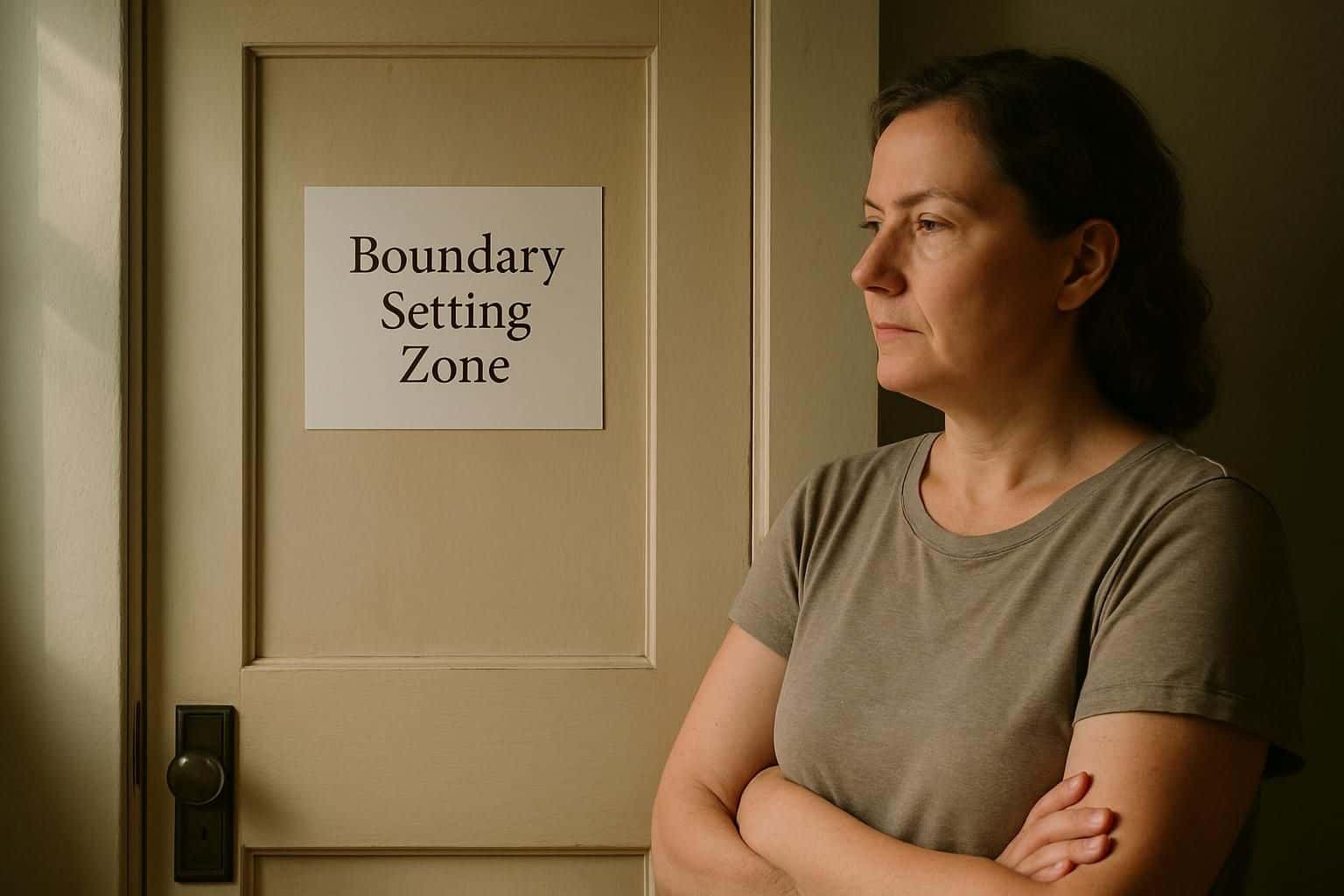If you often feel stress or guilt from your parents’ expectations, you’re not alone. Many adult children struggle to understand how to set boundaries with parents, especially when facing criticism, manipulation, or unwanted advice.
In this guide, you’ll learn 7 clear steps to create healthy boundaries that protect your well-being and promote mutual respect. You deserve peace of mind and sanity now.
Key Takeaways
Setting clear boundaries with your parents strengthens respect, preserves your peace of mind, and supports healthier interactions.
Express your feelings directly with “I” statements—saying “I feel upset because…” instead of accusations like “You never listen…” helps reduce tension and stress.
Be firm and steady about the limits you set, because backing down signals that your boundaries aren’t real.
It’s okay to create boundaries around your emotions, your body, and your conversations—even if your parents push back.
Getting support—from a trusted friend or a therapist—can ease feelings of guilt or stress if parents pressure you.
Table of Contents
Why Setting Boundaries With Parents is Essential

Okay, you get what boundaries are—now, here’s why they matter with your parents. Setting healthy limits with your mom and dad can boost your mental health and self-esteem. Dr. Becky Whetstone, who regularly helps adults work through parent issues, points out that clear boundaries protect you from harmful patterns.
Parents can sometimes push too much, offer advice you didn’t ask for, or even try to make decisions for you. It happens often—like in this story where my dad wants me to follow his plans rather than mine.
It can cause guilt, thanks to things we’ve heard growing up, like “honor thy father and mother”. But setting clear limits doesn’t mean shutting your parents out—it actually gives real connection a chance to grow.
Many women often feel trapped between keeping everyone happy and speaking up for themselves. Your feelings count—don’t forget that. Parents who are emotionally immature, or have narcissistic tendencies, might react badly.
Saying no can lead to criticism, manipulation, or even anger—triggering painful childhood memories and hurting your mental health. Firm boundaries put a stop to these unhealthy patterns.
They help you create the life you genuinely want. Speaking up honestly can feel scary, sure—but it’s essential for your emotional well-being.
Identify the Boundaries You Need

Knowing what limits you need is the first step to better family ties. You must spot areas where your parents cross lines that make you feel bad or stressed.
Emotional boundaries
Emotional boundaries help guard your feelings and mental health from people who drain your energy. Parents often cross these boundaries—by demanding emotional support or by dismissing how you feel.
You have the right to say “no” to guilt, emotional pressure, or playing therapist to your parents. Many women deal with this struggle due to childhood trauma or family patterns where their feelings weren’t valued.
Your emotional health matters just as much as anyone else’s in your family.
Creating clear emotional limits is similar to setting boundaries with an ex. You can say directly to your parents, “I can’t be your only support”, or “I need some space if I’m feeling overwhelmed”.
Using “I” statements clearly expresses your needs—you avoid blame or arguments this way. For parents showing narcissistic behaviors or mental health issues, firm limits safeguard your emotional well-being and can help end unhealthy family patterns—even if they’ve lasted years.
Physical boundaries
Physical boundaries protect your personal space, your body, and your privacy. They’re about limits—limits on touch, closeness, and visits from family. Often, parents aren’t clear on these lines; they hug without asking or enter rooms without knocking.
Setting these boundaries can mean saying “no” to unwanted hugs or touches. It can mean rules around home visits too, like how long your parents should stay. You’re allowed to claim your own space, without feeling guilty.
Many women create a private “off-limits” area at home, especially during family get-togethers, to keep their peace. Your room, your body, your rules.
Communication boundaries
Healthy communication boundaries keep your mental health safe, especially with parents who talk too much or say hurtful things. You absolutely have the right to control how often you speak, what you discuss, and how you spend time with family.
Setting clear rules around phone calls, texting, and visits prevents unwanted advice creeping in about your personal choices. Lots of women deal with parents who dig into private topics—like dating, career decisions, or how they raise their kids.
Choosing firm limits isn’t mean—it’s good, healthy self-care.
Personally, I’ve found “I” statements most helpful in these conversations. Something simple like, “I need space from comments about my weight”, usually goes down better than saying, “You always criticize how I look”.
Sure, parents might push back at first—but sticking to your rules helps them adjust over time. Solid boundaries can look like—no phone calls after 8 PM, visiting twice a month at most, or agreeing certain topics aren’t okay at family gatherings.
Steps to Set Boundaries With Parents

Setting clear limits with parents takes work but pays off with less stress and more peace in your life – read on to learn the exact steps that make this tough talk easier.
Be clear and direct
Clear words build strong walls. Subtle hints and gentle requests often slip past parents. You must clearly express your limits—no room for guesswork. A direct statement like, “Mom, I need you to call before coming over”, beats hoping she’ll just get it eventually.
Direct talk cuts through confusion and prevents hurt or frustration. Many women hesitate to be firm, afraid they’ll seem rude—but clear isn’t mean, clear is healthy. Research confirms straightforward talk reduces family conflicts by 40%.
Your mental health improves when you say exactly what’s needed, without softening or watering it down.
The clearer your message, the less room there is for misunderstanding. Speak your truth plainly – it’s not unkind to be clear about your needs.
Using “I statements” helps you make clear points without assigning blame. Even the mother and son relationship often grows stronger with clearer boundaries.
Next up, we’ll look at how “I statements” improve conversations with your parents.
Use “I” statements
“I” statements help you own your feelings—and make conversations smoother with your parents. They let you express yourself without pointing blame. Instead of saying, “You always criticize me”, try saying, “I feel hurt when you comment on my weight”.
A small adjustment like this can change a whole conversation. It helps parents listen openly, without feeling defensive.
These statements center on your emotions rather than their behavior. You can talk more openly. Try short phrases like, “I need privacy when I’m in my room”, or maybe, “I feel stressed when you call several times a day”.
Your feelings count, and “I” statements are an easy way to share them. Most parents pay attention better to “I feel” phrases than statements starting with “You make me feel”.
Stay consistent with your boundaries
After clearly expressing your needs with “I” statements, stick firmly to your boundaries. Staying consistent sends your parents a clear signal—you’re serious about this. Your mom might test your resolve by calling five times a day, despite your request for space.
It’s crucial to stand firm, so don’t answer every single call. Parents often resist new limits, hoping you’ll eventually cave.
Changing boundaries back-and-forth only confuses your parents, teaching them your needs don’t matter. Set your rule once, then stick with it every single time. For instance, if you clearly said no surprise visits, don’t bend the rule if they show up without notice.
This can feel tough at first—but your emotional health depends on it. Family relationships get easier when each person knows what’s coming. Sure, your parents may feel upset initially, but they’ll adapt to this new routine if you remain steady.
Anticipate their reactions
Setting new boundaries with parents can get emotional—fast. Some might get upset, sad, or even try making you feel guilty. My mom actually cried once, just because I told her I couldn’t come visit every weekend.
Dad, on the other hand, went quiet for days—no texts, no calls, nothing. So, think back on how they’ve reacted before—that helps you prepare mentally. Jot down exactly what you’ll say if they push too far or get upset.
Practice it out loud with a friend a few times, until it feels natural. Parents won’t always respect your boundaries right away, so it’s important you stay firm, even if things get tense.
Having a clear plan makes it much easier to keep your cool in the moment. Here are some quick tips for holding onto those boundaries over time.
Tips for Maintaining Boundaries

Keeping your limits firm with parents takes work and care. Setting these rules will help you feel less stressed and more at peace with your family ties.
Let go of guilt
Guilt can easily creep in, especially when setting boundaries with parents. A lot of women feel guilty saying “no” to mom or dad, due to old beliefs about how “good” kids behave. But this guilt isn’t serving you—it just holds you back from healthy thinking.
Your needs count, too! Therapy often points out that parents come with their own baggage and past hurts, which shape how they act with you now.
Guilt is like a rocking chair. It gives you something to do, but it doesn’t get you anywhere.
Notice guilt the moment it pops up. Then pause, and imagine if you’d feel the same about setting limits with a friend. Wanting your own space does not mean you’re a bad daughter. Parents who rely on guilt to control your actions usually lack emotional maturity.
Trust what you think and feel—you have the right to healthy boundaries, like everybody else.
Build a support system
Your friends can be a real lifeline as you set boundaries with your parents. Find people who truly understand what you’re dealing with—trusted friends, a therapist, even a support group.
These are the people who have your back, especially when your parents push against your limits. They’ll remind you, gently but firmly, that your needs matter. A solid friend group helps you stick to your decisions, even through emotional pressure.
Having this outside network is key, especially if you’re dealing with emotionally immature or narcissistic parents who might try tactics like gaslighting.
Be open with your support circle about family struggles. Share both your wins and the difficult moments. Friends can offer fresh perspectives on your family interactions. They might see harmful patterns you overlooked.
Good friends lift your mood and give you room to express your genuine feelings. This kind of support cushions you from family stress and makes your experiences feel less lonely.
Practice self-compassion
Self-compassion means treating yourself kindly—just as you’d treat a good friend. Lots of women struggle with harsh self-talk, especially while trying to set boundaries with parents.
Be gentle with yourself through that process. Saying, “I deserve respect”, might become a daily reminder you use. If your mind tells you, “I’m being selfish”, try shifting it to, “I’m taking care of my needs”.
Daily self-care habits boost mental wellness. Even five minutes a day for deep breaths—or writing down three things you did well—can make a difference. Small, intentional actions build emotional strength.
Research shows self-compassion helps lower anxiety and stress. And that’s huge, particularly if family situations trigger feelings of guilt or doubt around boundaries.
Special Scenarios for Setting Boundaries

Setting limits with parents gets trickier after big life changes like marriage, having kids, or moving back home – these events create new roles that need clear rules to protect your peace.
After marriage
Marriage changes family roles, so it’s key to set clear limits. Your spouse comes first now—not your parents. Make sure you put couple time at the top of your list, and let parents know they need to call ahead before visits.
Many parents still view you as their little girl—rather than an adult with her own space. They might offer unwanted advice about handling your marriage or running your household.
Stand firm if they step over a boundary. Say something simple like, “Thanks for your thoughts, but we’ll handle it our way”.
This helps quiet down any pushy opinions and strengthens your bond as a couple. Your mental health counts too—don’t let guilt push you into accepting comments that aren’t helpful.
After having children
Having a baby changes how you deal with your own parents. Your mom and dad may suddenly jump in, offering endless advice—or worse, trying to take control. Setting clear rules helps avoid confusion—like babysitting schedules, meal times, and discipline styles.
Just be straightforward, saying something like, “We really need you to stick to the baby’s sleep schedule”.
Many new mothers feel pressure from their parents’ strong opinions—on breastfeeding, sleep training, or discipline strategies. But remember—those parenting decisions belong fully to you and your partner.
Be firm and set clear limits on unwanted advice, maybe telling them calmly, “We’ve decided this way works best for our family”.
Some parents find it hard switching to their new roles as grandparents—no longer in charge, now on the sidelines. These adjustments can sometimes trigger immature reactions, even anger.
Some pregnant women even feel manipulated or confused if their mothers insist they’re doing things “wrong”. Protecting your parenting decisions means having clear boundaries—which can help both generations feel respected and heard.
If things get tricky between you and your parents, behavioral health specialists can offer useful support. They help you tackle tricky family issues and keep those essential boundaries stable.
Knowing whether professional help could ease family tension makes a huge difference in balancing your needs with theirs.
When living with parents
Living at home as an adult means setting clear ground rules. Your personal space counts—a lot. Simple things like knocking before coming into your room, privacy during phone calls, and quiet time alone all keep the peace.
Adults often feel stuck, with too many rules shaped by parents. Weekly family talks can ease household tensions better than daily nagging.
Money issues also need distinct boundaries. Decide together on fair ways to handle bills, food costs, and chores, with everyone’s voice heard. Unwanted parenting advice hits harder because you’re living together.
Try using direct lines such as “I’ve got this” or “I’ll let you know if I need a hand”, to gently stop unwanted input. Your mental well-being relies a lot on feeling in charge of your own area—especially your bedroom.
When to Seek Professional Support
Professional support is critical if your parent shows signs of mental health issues or narcissistic rage. Therapy can truly help adults stuck in harmful family relationships. Around 76% of people using therapy report positive outcomes—strong evidence it works, especially with boundary concerns.
You don’t have to go through gaslighting or emotional immaturity alone. Online services like BetterHelp are affordable, starting at $65 a week, and Talkiatry often costs under $30 per session.
A skilled psychiatrist can help you tackle tough family situations, especially if unwanted parental advice harms your mental health. Reaching out for help isn’t weakness—it’s self-care.
Women often face extra stress during major life changes. Marriage and pregnancy are times when setting clear boundaries can become especially tough. Professionals like neurologists or mental health experts can break down how family stress affects your mind and body.
Physical boundaries matter, too—don’t overlook their importance. Support groups can boost your support network beyond individual therapy sessions. Finding the right therapist gives you practical tools to manage guilt and hold your ground, without harming valuable relationships.
How Will Setting Boundaries With Parents Evolve in 2025?
By 2025, digital tools will reshape how we handle boundaries with parents. Apps tracking family conversations will let women easily notice patterns, like unwanted advice or emotional stress.
Whenever a chat heats up—boom—you’ll receive a quick alert, giving you a chance to pause and cool off. Plus, mental health platforms will offer short video calls with psychiatrists to help you handle tough family moments as they happen.
Family therapy will change too, paying more attention to adult children’s well-being. Fresh studies into brain health clearly show how poor boundaries directly impact our mental state.
Doctors will treat parent-child conflicts as real health issues, with greater seriousness and care. Often, women feel gaslighted trying to set boundaries with parents, but new support groups will quickly match you up with others going through similar stuff.
These groups will be especially helpful for pregnant women or new moms whose parents struggle to respect their space or parenting style.
People Also Ask
How can I handle unwanted advice from my parents?
Be clear and honest with them. Try saying something like, “I appreciate your concern, but right now, I need to figure this out myself”. Usually, parents give advice because they care—but it’s still okay to gently remind them you’re making your own decisions.
What family situations make boundaries tougher to set?
In tight-knit families, setting boundaries can feel extra tricky. Some cultures prioritize family wishes over individual choices. It’s especially tough if parents hold strong opinions about big decisions—like disagreements over pregnancy choices.
Are boundary problems a sign of mental health issues?
Not usually. While some boundary struggles may relate to mental or neurological conditions, most parent-child issues are pretty normal. They often just reflect differences in wants, expectations, or viewpoints between you and your parents.
What’s a good way to set boundaries without upset feelings?
Use “I” messages instead of blaming statements. Say something like, “I get stressed when you call several times a day”, rather than “You keep calling too much”. Choose carefully what really matters to you, and stay friendly yet clear about your limits.
